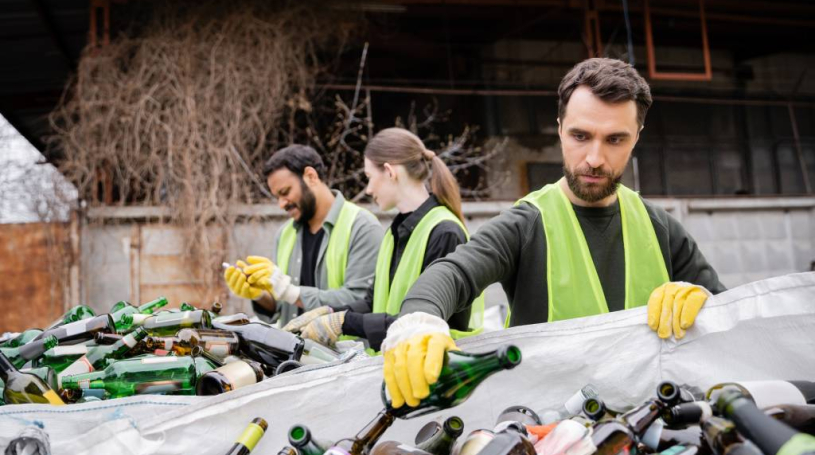Where to Recycle Glass: Tips for Easy and Efficient Disposal
Have you ever wondered what happens to all those wine bottles and food jars after they're emptied? Glass recycling isn't just a trendy sustainability practice — it's a huge step in reducing waste and energy consumption.
Knowing your glass facts is important, as recycling just one glass bottle saves enough energy to power a 100-watt bulb for four hours. Whether you're a beverage producer handling thousands of bottles or a conscious consumer, knowing where to recycle glass and how to recycle glass properly makes a real difference.
Where Can You Recycle Glass?
Since recycling is so beneficial to our environment, you have a ton of options when it comes to recycling glass and where to recycle glass bottles. Most cities offer curbside recycling programs that accept glass containers. But if that's not available in your area, you're not out of luck.
If you’re unsure where to take glass for recycling, local recycling centers and bottle banks are reliable alternatives. Many grocery stores and public spaces have designated glass recycling bins. For wine producers and beverage businesses, specialized recycling services often offer bulk collection programs tailored to your needs.
Some states have bottle deposit programs where you can return glass containers for a small refund. It's not just good for the planet — it's good for your wallet too. Where can I recycle glass? Check out our glass recycling drop off map to find the nearest recycling location to recycle glass in your area and check out our glass recycling guide.
How to Recycle Glass
If you’re going to start recycling glass, you’ll need to know what you need to do:
1. Gather Everything
Start by collecting all your glass items in one spot. A dedicated bin in your kitchen or storage area works great. For businesses, consider setting up collection stations in high-traffic areas where employees can easily separate glass from other materials.
It’s best not to mix different types of glass. That beautiful wine glass is made differently than your pasta sauce jar and needs separate handling. Having designated bins for different types of glass makes the recycling process more efficient.
2. Make Sure It’s Clean
You don't need to scrub everything spotless, but a quick rinse goes a long way. Labels can stay on, and minor residue is fine. The recycling facility handles the deep cleaning. For businesses handling large quantities, consider implementing a simple rinse station near collection points.
3. Find a Proper Recycling Method
For businesses figuring out where to recycle glasses, partner with local recycling services that offer regular pickup. Many provide special bins and scheduled collections. This ensures consistent recycling practices and helps track your sustainability efforts.
For individuals, use your curbside recycling bin or find a nearby drop-off location. Many communities have special glass recycling events or permanent collection sites.
What Kind of Glass Can Be Recycled?
Not all glass is created equal. Here's what's typically accepted:
- Food and beverage containers
- Clear, brown, and green glass bottles
- Glass jars and containers
What's not accepted:
- Pyrex or heat-resistant glass
- Ceramics or dishware
- Light bulbs
- Mirrors
- Windshields
- Crystal glassware
Frequently Asked Questions
What is the best method of recycling glass?
The most efficient method is separating glass by color and keeping it clean. For businesses, working with dedicated recycling services ensures proper handling and maximum recycling efficiency.
Color separation is crucial because different colored glass has different chemical compositions and mixing them can compromise the recycling process.
Why is there no broken glass in recycling?
Broken glass can be dangerous for workers and can contaminate other recyclables. If you have broken glass, wrap it carefully and dispose of it in regular trash. For businesses, provide clear guidelines to employees about handling broken glass safely.
Do you need to rinse glass before recycling?
A quick rinse is helpful but don't stress about perfection. Remove obvious food residue, but labels and slight residue are okay. The recycling facility handles the rest. For wine bottles and beverage containers, a simple rinse is usually sufficient.
Final Thoughts
Glass recycling isn't just environmentally friendly, but it's a smart business practice that resonates with today's conscious consumers. It's important to know where to recycle glass. Glass can be recycled many times without losing its quality, so every bottle or jar that can be recycled is a step toward a more sustainable future.
For businesses, proper glass recycling can enhance your brand's sustainability credentials and appeal to environmentally conscious customers. For individuals, it's an easy way to contribute to environmental conservation.
So next time you finish that bottle of wine or empty that jar, give it a quick rinse and send it on its way to its next life. Every piece counts in building a more sustainable future.


